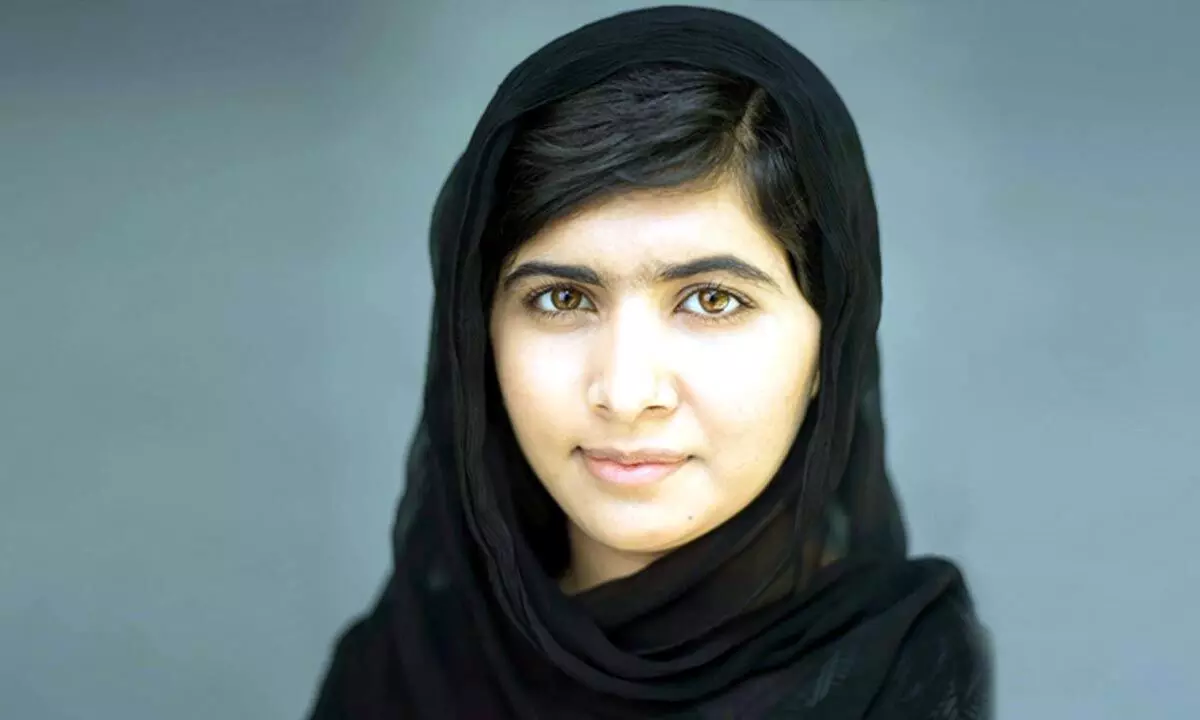Live
- Modi performs puja at Triveni
- Jammu records season’s lowest minimum temperature as Kashmir valley shivers
- Scheme to give Rs 1K to women to be rolled out in 15 days
- Flirty Texts That Turn into Dates
- ‘Asli’ Sonakshi shares a glimpse of herself in ‘golden hour’
- Shraddha Kapoor took ‘thepla’ for her ‘foreign’ trip
- ChatGPT Now Supports Video Inputs: All Details
- B.Com vs BBA: Which degree better prepares you for an MBA?
- Apple Intelligence now features Image Playground, Genmoji
- National Energy Conservation Day: Fostering a sustainable future
Just In
International Malala Day 2023: Who is Malala Yousafzai? 10 Facts About The Youngest Nobel Laureate


Malala Yousafzai, Pakistani education activist
Malala Day, celebrated annually on July 12, is a global celebration honouring the extraordinary courage and unwavering dedication of Malala Yousafzai.
Malala Day, celebrated annually on July 12, is a global celebration honouring the extraordinary courage and unwavering dedication of Malala Yousafzai. She is a Pakistani educational activist and Nobel laureate. Malala's advocacy for girls' education and her unwavering stance against the oppressive Taliban regime have earned her international recognition.
Undeterred by this injustice, she Malala fearlessly stood up for the right to education, risking her life to attend school and inspiring many others to do the same. Malala Day serves as a reminder of her extraordinary advocacy and continued pursuit of quality education for all.
Unfortunately, Malala's audacity made her a target for the Taliban. In October 2012, at the tender age of 15, she was shot in the head by a Taliban on her way to school. Despite the trauma she faced, Malala's spirit remained intact. She miraculously survived and continued her fight for education, becoming an even stronger voice for children's rights.
10 FACTS ABOUT MALALA YOUSAFZAI
1. Malala Yousafzai, born July 12, 1997, is a Pakistani activist and the youngest Nobel laureate in history. She received the Nobel Peace Prize in 2014 at 17 for her advocacy for girls' education.
2.
2. Malala's activism began when she was just 11 years old, writing a blog for the BBC's Urdu service under a pseudonym to document her life under Taliban occupation in Pakistan's Swat Valley. She spoke out against the Taliban-imposed ban on girls' education and called for the right to education for all.
3. In October 2012, a Taliban gunman shot Malala in the head as she was coming home from school. The attack received worldwide attention, and Malala was flown to the UK for medical treatment. She made a remarkable recovery and continued her activism with even greater determination.
4. Despite the assassination attempt, Malala remained resilient and advocated for girls' education worldwide. She is the co-author of the memoir "I Am Malala: The Story of the Girl Who Standup for Education and Was Shot by the Taliban, " published in 2013 and became an international bestseller.
5. Malala founded the Malala Fund, a non-profit organization that advocates for girls' education and empowers young women to reach their potential. The organization works in regions around the world, including Pakistan, Nigeria, Jordan and Kenya, to support girls' education initiatives.
6. In 2013, Malala delivered a speech at the United Nations headquarters on her 16th birthday, amplifying her message and making her a global symbol of the fight for education and equality. of genre. The UN declared July 12 as “Malala Day” in honor of her dedication to her education.
7. Malala has received numerous awards and honours for her activism. In addition to the Nobel Peace Prize, she has been recognised with the Sakharov Prize for Freedom of Thought, the Peter J. Gomes Humanitarian Award from the Harvard Foundation, and honorary Canadian citizenship, among others.
8. Continuing her education, Malala enrolled at Oxford University in 2017, studying Philosophy, Politics and Economics (PPE). She graduated in June 2020 with a bachelor's degree.
9. In recent years, Malala has expanded her focus beyond education to advocate for refugees, particularly those displaced by the Syrian civil war. She has visited refugee camps and has called for more support and opportunities for refugee children.
10. Malala's story has inspired millions of people worldwide and she has become a leading voice for youth rights and education worldwide. She continues to speak at conferences, engage in activism, and use her platform to raise awareness about the importance of education and gender equality.

© 2024 Hyderabad Media House Limited/The Hans India. All rights reserved. Powered by hocalwire.com






